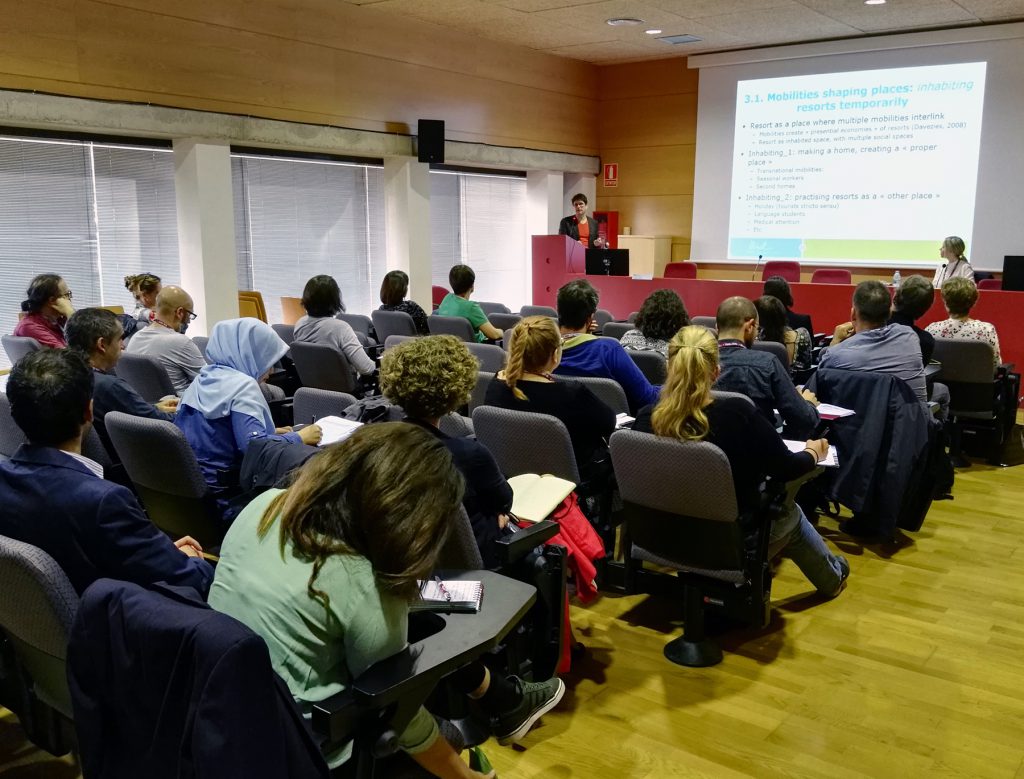24/10/2017
International researchers debate the transformation of tourism destinations at the URV
The conference “Tourism shaping places. Mobilities and tourism destination evolution” took place at Vila-seca and featured 31 scientific presentations

The conference “Tourism shaping places. Mobilities and tourism destination evolution” took place at Vila-seca and featured 31 scientific presentations
From 18 to 21 October, researchers from around the world gathered at the URV’s Faculty of Tourism and Geography to participate in the conference “Tourism shaping places. Mobilities and tourism destination evolution”. More than sixty attendees from nineteen countries took part in 31 scientific presentations grouped into 10 parallel sessions focusing on emerging tourism models, mobilities, spaces and the sustainable evolution of tourism destinations.
Among the presenters were Kevin Hannam, professor of Tourism Mobilities at Middlesex University Dubai, who studies mobilities as processes of trauma, transformation and transition, Szilvia Gyimóthy, head of the Tourism Unit at the Department of Culture and Global Studies at Aalborg University in Denmark, who researches the sharing economy in different contexts, and Mathis Stock, head of the Tourism Cultures and Natures Group of the Institute of Geography and Sustainability at the University of Laussane, Switzerland, who describes tourism complexes as urban forms that are distinct from cities.
Noam Shoval, from the Hebrew University of Jerusalem, gave the closing talk in which he discussed the principal research lines analysed during the conference, including the evolution of destinations, the influence of space on the behaviour of tourists, the use of technology in the tourism experience, and the role of mobility in the configuration of tourism activities.
The participants were taken by local experts on a field visit to some of the most important areas of Barcelona in terms of numbers of tourist visitors, such as the Raval, the Gothic Quarter and the Eixample, and also had the opportunity to visit Tarragona, Reus, Salou and Vila-seca.
The conference was organised by Salvador Anton, Antonio Paolo Russo and Julie Wilson of the Territorial Analysis and Tourism Studies Research Group (GRATET) and Dieter K. Müller, representative of the Tourism, Leisure and Climate Change Commission of the International Geographical Union.
The participants were welcomed by Josep Manel Ricart, vice-Rector for Scientific and Research Policy at the URV, Manuela Moya Moya, deputy mayor and councillor for Territorial Services and Education of Vila-seca Town Council, and Marta Nel·lo, dean of the Faculty of Tourism and Geography at the URV.
The event was organised by the Territorial Analysis and Tourism Studies Research Group (GRATET) of the URV’s Department of Geography and the International Geographical Union (IGU) and forms part of the MOVETUR project, which studies how changes to global mobility patterns are transforming tourism destinations. The project is funded by the Spanish Ministry for the Economy, Industry and Competitiveness and the European Union. Also collaborating in the conference were the Tourism and Leisure Science and Technology Park of Catalonia, the Tourism and Sustainability team of the Open University of Catalonia and Tarragona Provincial Council.
The International Geographical Union (IGU) is an international academic organisation dedicated to promoting the study of Geography by coordinating research and teaching in countries throughout the world.
